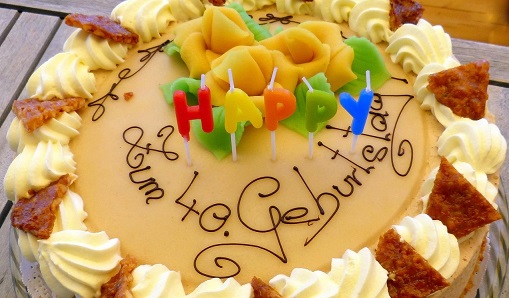
Birthdays in Germany are not just about balloons and cake – they’re about tradition, respect, and a set of cultural expectations that go far beyond party hats. Whether you’re new to German culture or planning to wish a German friend well, understanding how birthdays are celebrated in Germany will help you avoid faux pas and genuinely impress your hosts.
Germans take birthdays seriously. But that doesn’t mean they are extravagant. Instead, they are thoughtful, structured, and rooted in time-honored practices that stretch from kindergarten celebrations to 100th-birthday ceremonies covered by local newspapers. From bringing your own cake to work to avoiding early congratulations, here’s everything you need to know about how Germans celebrate birthdays – and what it says about their culture.
➡️ Related: Punctuality in Germany: More Than Just Being on Time
Taboo Number One: Never Say Happy Birthday Early
If there’s one thing to remember about birthdays in Germany, it’s this: never wish someone a happy birthday before the actual date. Germans view early birthday wishes as a superstition – or worse, a jinx.
- Saying “Alles Gute zum Geburtstag!” (Happy Birthday) even a few hours early is considered bad luck.
- Celebrating early with gifts or parties is equally frowned upon.
If you know you won’t see the person on their actual birthday, it’s more polite to say nothing in advance or offer a belated greeting after the fact.
Who Throws the Party? The Birthday Person Themselves
Unlike in some cultures where friends or family throw a surprise party, in Germany, it’s the responsibility of the birthday person to organize and fund the celebration.
This tradition starts in childhood and carries through adult life. It’s common to:
- Host a gathering at home or a restaurant
- Bring cake to the office or classroom
- Provide drinks and snacks for guests
The idea is that the birthday person is grateful for another year and shows appreciation by giving back. It’s a reflection of German self-responsibility and mutual respect.
➡️ Also read: Invited to a German Home? What to Bring and How to Behave
Workplace Birthdays: Bring the Cake
If it’s your birthday and you work in Germany, you’re expected to bring your own cake – not the other way around. Colleagues will often:
- Gather in a break room or kitchen
- Sing “Zum Geburtstag viel Glück” (a German version of Happy Birthday)
- Share cake, coffee, or Prosecco
Bosses and coworkers may give small gifts or flowers, but the celebration is generally low-key and structured around work hours. Don’t expect office-wide decorations or elaborate surprises unless it’s a milestone year.
Children’s Birthdays: Crown, Wreaths, and Games
German children’s birthdays are steeped in symbolic rituals:
- Birthday crown (Geburtstagskrone): A paper or felt crown worn by the birthday child
- Birthday wreath (Geburtstagskranz): A wooden ring with holes for candles – one for each year of life
- Wishing candle: The birthday child lights candles while others sing
- Kindergeburtstag: A party with themed games, goody bags, and homemade cakes
Parents often host these events at home or book special locations like climbing gyms or puppet theaters. The day is structured, playful, and emphasizes shared joy over consumerism.
Milestone Birthdays: 18, 30, 50, 60, 80, 100
Certain birthdays carry extra weight in German culture:
- 18: Legal adulthood – celebrated with formal parties or special trips
- 30: If unmarried, a man must sweep the steps of a public building; a woman may clean doorknobs – until “rescued” by a kiss
- 50 & 60: Often marked by larger gatherings, speeches, and jokes about aging
- 80 & 100: Honored with local newspaper announcements or greetings from the mayor
Milestones are often accompanied by customized decorations (giant “50” balloons or banners), nostalgic photo albums, and plenty of humor about getting older.
➡️ Explore next: Why Germans Love Rules (And What That Says About Their Culture)
Birthday Foods: Cakes, Pretzels, and Hearty Meals
While Germany doesn’t have a universal birthday dish, regional favorites and personal traditions play a big role:
- Homemade cakes: Apple cake, marble cake (Marmorkuchen), Black Forest cake (Schwarzwälder Kirschtorte)
- Pretzels and savory platters: In the South, birthday breakfasts may include large pretzels, cheese, and cold cuts
- Potluck-style buffets: Guests might contribute salads or desserts
- Beer and sparkling wine: Adult parties usually include light drinks, not excessive consumption
The emphasis is on comfort, sharing, and often seasonal or local ingredients.
Birthday Decorations: Tasteful and Meaningful
Don’t expect glitter explosions or commercial decorations in most German households. Instead:
- Tables are set with candles, flowers, and simple centerpieces
- A framed baby photo or memory board might be featured
- Handmade cards and banners are cherished over store-bought ones
Germans appreciate sentiment and effort. Over-the-top parties with huge gifts may be seen as “übertrieben” (over the top).
Gift Etiquette: Thoughtful, Not Flashy
Bringing a gift is expected when invited to a birthday party, but:
- Avoid gifts that are too expensive
- Include a handwritten card
- Consider small cultural or regional items, books, wine, or homemade goods
- Flowers are welcome – but avoid white flowers (funeral connotation)
If you’re unsure, ask ahead or give a voucher. Germans value usefulness and sincerity over novelty.
Singing Happy Birthday: More Than One Tune
Germany has several birthday songs:
- “Zum Geburtstag viel Glück” (To your birthday, much luck)
- “Wie schön, dass du geboren bist” (How wonderful that you were born)
- English “Happy Birthday” is also common, especially among younger generations
Singing is often done before cutting the cake and is seen as a heartfelt gesture.
Belated Wishes Are Okay – Early Ones Are Not
If you forget a birthday, it’s acceptable to give belated congratulations:
- Say “Nachträglich alles Gute zum Geburtstag!” (Belated birthday wishes!)
- Send a message or small gift if you missed a major celebration
Just don’t mention the birthday ahead of time. It’s better to be late than early.
What Birthdays Reveal About Germans
German birthday customs reflect broader societal values:
| Cultural Value | Birthday Expression |
|---|---|
| Responsibility | Hosting your own party and providing for guests |
| Modesty | Low-key, heartfelt celebrations |
| Order | Structured rituals and clear etiquette |
| Sincerity | Handmade cards, meaningful gifts, personal messages |
| Superstition | No early wishes – avoid bad luck |
These customs create predictability, respect, and emotional depth in celebrations.
➡️ Related: Dining with Germans: Table Manners That Will Impress
Celebrating a birthday in Germany is about more than cake and candles. It’s about acknowledging time, effort, and connection – in a way that balances joy with dignity. From child-friendly rituals to humorous milestone antics, German birthday traditions blend respect for the past with hope for the future.
If you’re lucky enough to attend or host a German birthday, follow the rhythm: wait for the day itself, bring your gratitude, and don’t forget the cake.
➡️ Explore more cultural insights:







